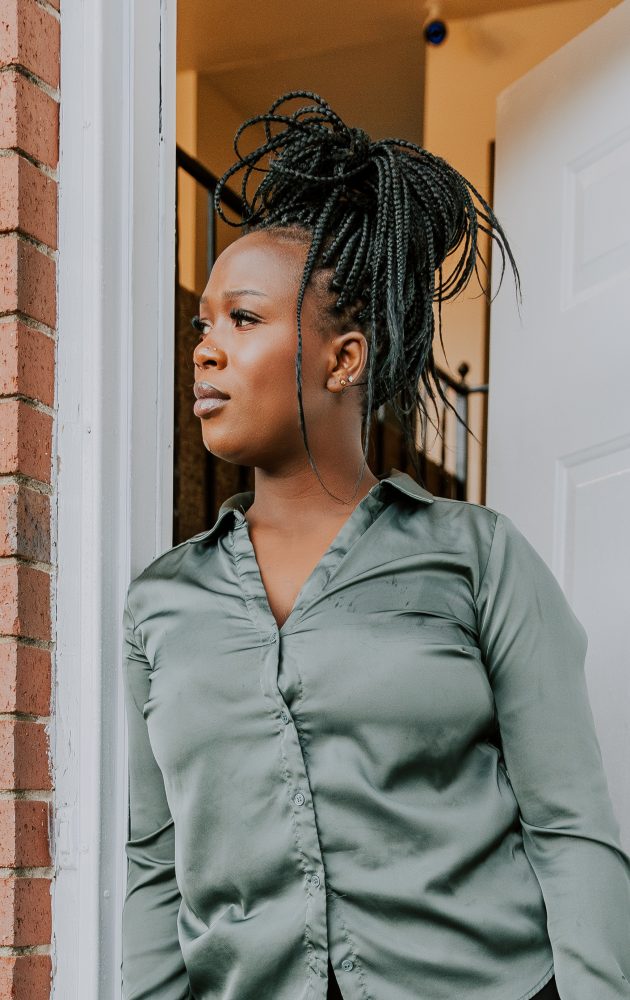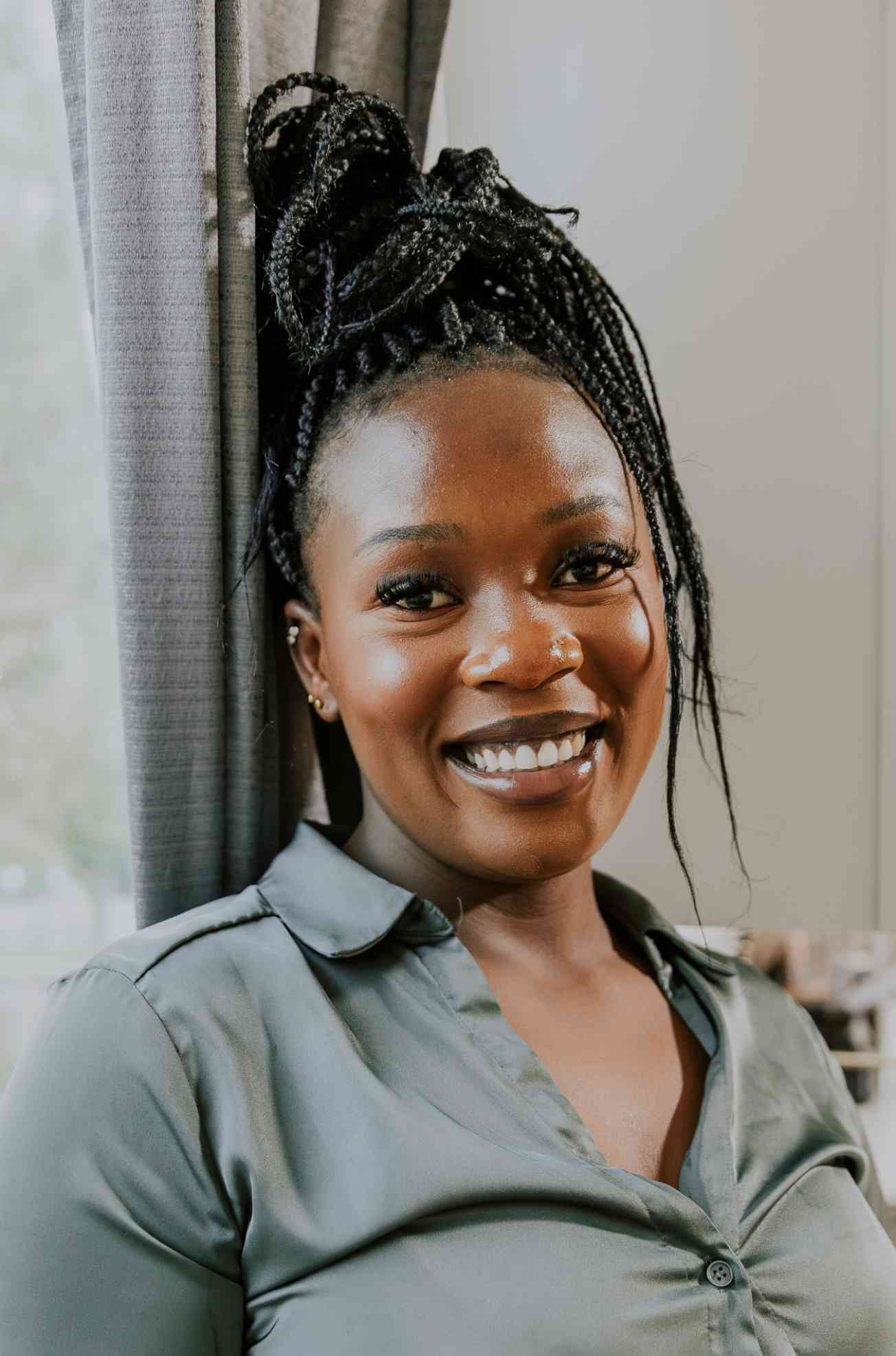A Refugee Shares Both the Hard and Good From Her Experience in Foster Care

I’m from Rwanda. I was born and raised in a small refugee camp. I grew up there until I was about 15. I came here with two of my siblings in the foster program as a refugee. My family is from the Congo, but I never lived there. In the camp, there’s not a lot of opportunities for parents to have jobs. Our parents weren’t allowed to work because they weren’t Rwandese citizens. School was just a daycare. They had a bunch of teachers that they didn’t pay. The teachers would kind of teach us what they knew, but they’d never been to school either.
My mother passed away when we were very young and our father left us right after she passed. He left us in our little camp as small kids, and my grandma came by to say “hi” one day when we were there. My dad left when I was four, but because we all lived in the same camp, he still lived a few blocks away. And so, my grandma, my dad’s mom, found us little kids at the house by ourselves, and she took us in and raised us.
My grandma lives in Utah too. When I graduated from foster care I moved near her to take care of her. She was by herself and needed somebody to help her navigate this country.
In the beginning, it was a challenge to be placed in a foster home. Language and communicating needs was the hardest thing. Because my [foster] family is American and only speaks English, there was no one to help me and my siblings translate. When we came, we spoke Kinyarwanda, Swahili and French. But with our foster family we had to use sign language. And the food. I just couldn’t do the food. For a long time they were so excited to get us all this American food and we were so sick. We had never seen pizza. We had never seen a hamburger. We had never seen meat besides just once a year on Christmas. We just had rice and beans, and wet porridge. But, we were so lucky not to be separated.
I’m very grateful for our foster experience. It doesn’t happen to all kids.
I've met a lot of kids that are separated from their family. So I appreciate that we were brought here together with my siblings, but my (foster) parents tried to separate us from our (African) community. They wanted us to learn about the US.
They said it was to immerse ourselves and to push ourselves to learn English better and faster. So we stayed together as siblings but in the beginning we weren’t seeing our family like my grandma or my aunts. I had arguments, a lot of arguments with my (foster) mom. But she later told us she wanted to give us the ability to make friends that are American, to go to school and learn in public schools, and survive in public areas without the translators. So her motives were kind of cool.
Her approach was beneficial to me in ways of growth and self discovery as an African woman learning a different culture and traditions. They taught me to grow into an independent woman. In African culture, we’re taught to become stay at home moms, and not in a positive way - in a way to be controlled.
I think what my (foster) mom tried to do was allow us to figure out who we were outside our comfort zones, away from our relatives, like our grandma or friends that spoke our old language.
And I can appreciate it now. I didn’t know back then but today I can appreciate it. I like my African culture, but I also love this American understanding of what a woman should look like and what a woman is capable of doing.
I was placed in ninth grade in a public school when I arrived. Ninth grade is when they start counting credits. I didn’t know anything. Then we transferred to a charter school. It was an International Charter School, and they have a way they teach kids that isn’t about credits and instead focuses on English. They had ESL classes and you had to pass a test to get out of the ESL class. But once we could speak English my dad felt like we weren’t learning enough. He took us out of our charter school and sent us to public school where we were challenged. It was a little difficult because everybody was ahead of us but the teachers did really well and there were after school programs with tutors that came to our home and tutored us online. We had a lot of hours to work with teachers who were kind and understood our background.
I liked that charter school. I wanted to stay with my friends and to stay in my comfort zone. The people that spoke the same language were people that looked like me. But, today, I appreciate what he did because I learned a lot and I’ve seen both worlds.
We got lucky and have an amazing relationship with my foster family and a good relationship with my real family. I don’t live at home anymore, but we have Sunday dinners together and I’m fully welcomed. I also have my grandma and my aunts and I see them often. It’s amazing to have both families and learn from both now that I’m an adult.

I graduated high school in 2018. And I did go to college for two years and get my Associates Degree. After that, I took a year of self discovery and I just haven’t been back. Now I work with CCS. And I really enjoy that work. I also work with dementia patients. I’m just working a lot to figure myself out.
Since I’ve been here, it has been go go go go. I got here. I was put in school, and I was doing all the things I was supposed to be doing. Now I’m taking time to learn who I am. I’m African and I’m also partial American. How can I combine these two? I’ve also been healing from a lot of family trauma, learning a lot of forgiveness, self forgiveness and family forgiveness. I’ve had a lot of questions and I’ve been in therapy and that has helped me learn and heal. I feel like I’ve learned a lot about myself by working with foster kids. They remind me of myself. It’s just amazing to see who they’re becoming and I’m there for them. I’m there to support and guide them and I’m there if they have questions. I love the ILP House. I wish I had had that when I first got here.
The ILP house is a program that was put in place about 2020. There’s an apartment and kids come to it when they’re 18. We work with young adults and we help get them into school, get them situated in jobs, and help them navigate and understand the American Dream. I love this job. It makes me feel that I’m making a change.
The young adults have three years and six months before they have to exit the ILP house at age 21. We prepare them to live without CCS. We teach them how to budget, how to get a job, how to have everything lined up before moving out. While they are in the ILP house we require them to go to school and to have a job. The classes are also available to young adults that are still living with their foster family.
Without the ILP House kids don’t know anything about housing. They’re usually 18 or 19. CCS takes over everything - like helping us pay our bills or explaining how to go to college. I never really understood how to pay until I exited. Within the foster and ILP program, we teach them what it takes to pay rent. At ILP they don’t really pay rent, they pay rent to us and we save that money for them when they exit the program. But then they are in the practice of paying rent. We teach them ways to budget in this world.
I'm there to teach them but I'm learning a lot about myself as I work with them. And I'm learning a lot about joy.
The thing I want foster parents to know is that the most important thing you can do is to try and understand where these kids come from. A lot of foster kids don’t know how to communicate. We feel weak talking about what we are going through. So listening and asking questions help a lot of kids who need therapy. We just need a time when somebody will listen and love us when we might not even know what love was. A lot of foster parents are doing an amazing job loving these strange kids they’ve never met. I remember my dad telling me he loved me the first time. I freaked out, called my mom and I was like, “That is weird.” That experience taught me a lot of us don’t even know what love is and foster parents are being there and supporting us, teaching us love.
Our team members obtain informed consent from each individual before an interview takes place. Individuals dictate where their stories may be shared and what personal information they wish to keep private. In situations where the individual is at risk and/or wishes to remain anonymous, alias names are used and other identifying information is removed from interviews immediately after they are received by TSOS. We have also committed not to use refugee images or stories for fundraising purposes without explicit permission. Our top priority is to protect and honor the wishes of our interview subjects.